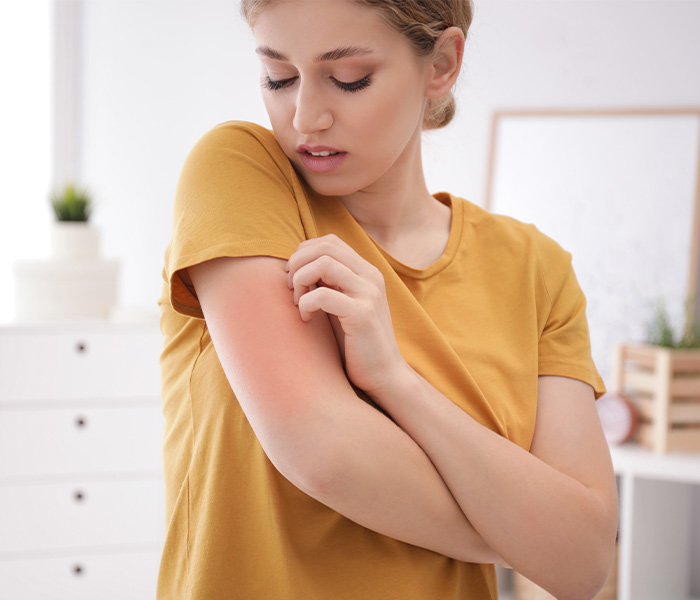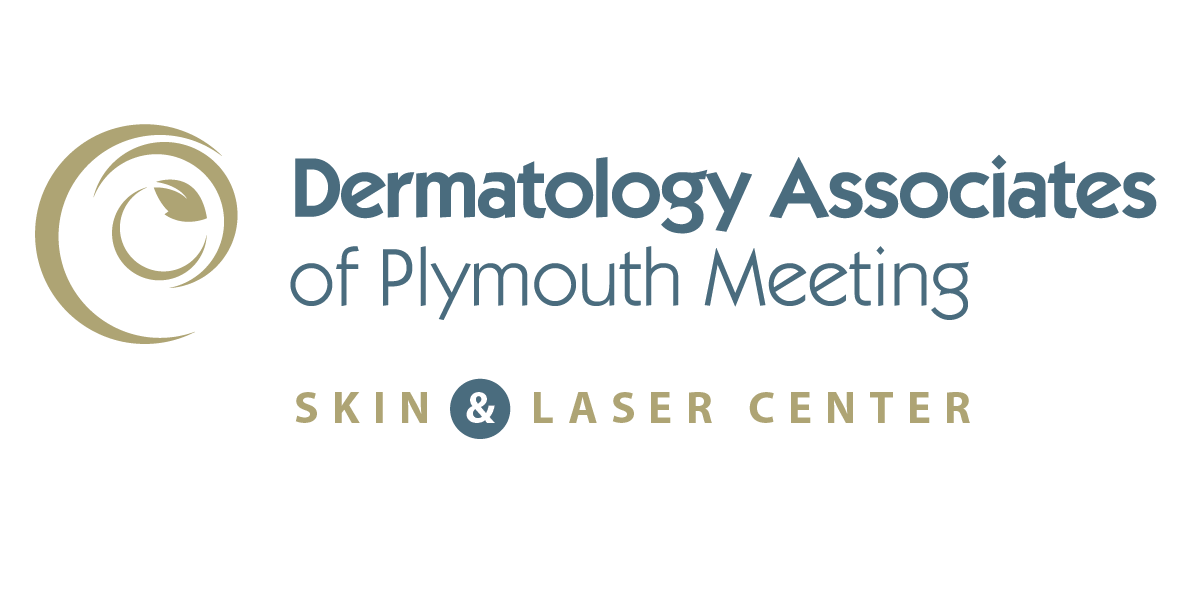Conditions
What is Eczema?
Eczema is a skin condition that affects more than 31 million Americans and can appear anywhere on the body. It is normally first noticed as itchy, uncomfortable red patches, although symptoms and severity can vary. The term, “eczema,” encompasses a group of common, and in most cases very manageable, conditions that cause inflamed skin. There are several types of eczema, and with proper treatment and care, many people with eczema can manage flares and symptoms with the help of their dermatologist.

Types of Eczema
There are several types of eczema: atopic dermatitis, contact dermatitis, dyshidrotic eczema, nummular eczema, seborrheic dermatitis and stasis dermatitis. Each type of eczema has its own triggers and treatment requirements, and some people experience more than one form of eczema. When you first notice symptoms of eczema, it is important to talk with your dermatologist to understand the best treatment options, as well as how to learn how to prevent or minimize flare-ups.
Eczema symptoms can include:
- Itchy patches of skin
- Changes in skin tone (commonly appearing as redness in lighter skin tones and purple or ashy patches in darker skin tones)
- Raised patches
- Open or “weeping” sores
- Dry, sensitive skin
- Areas of swelling
Atopic dermatitis
A chronic and inflammatory form of eczema that leads to dry, scaly skin, redness or purplish patches, itching, rashes or open sores during flare-ups. While the exact cause is unknown, it occurs as an immune system response to allergens or irritants.
Contact dermatitis
A form of eczema that occurs when an irritating substance or allergen touches the skin. Common irritants include detergents, fumes, astringents, certain soaps or artificial fragrances. It most commonly appears on the hands or parts of the body that encounter the allergen.
Neurodermatitis
A rarer form of eczema that results from intense itching and scratching. It appears as dry, thickened patches of skin caused by prolonged scratching over time. Neurodermatitis is sometimes called lichen simplex chronicus.
Dyshidrotic eczema
Leads to small, fluid-filled blisters on the feet and hands, frequently on the edges of fingers, toes or soles of the feet. It can be triggered by stress, moisture, exposure to nickel in jewelry or allergies. It also leads to itching and scaly or cracked skin.
Nummular eczema
Can occur at any age and appears as coin-shaped spots that are extremely itchy. Triggers are thought to be insect bites, dry skin or skin inflammation.
Stasis dermatitis
Is also called venous eczema, venous stasis dermatitis and gravitational dermatitis. It typically occurs in the lower legs when blood flow stagnates and can lead to swelling around the ankles, itching, pain and infection in more serious cases.
Eczema Treatment Options
Eczema is not a contagious condition. Treatment can help individuals with eczema become more comfortable. Treatment for eczema is also important to minimize the risks for infection or scarring, which can occur as a result of prolonged scratching. For many eczema patients, the basics of treatment and care comes down to managing flares by understanding triggers, having a daily skin care routine and using over the counter or prescription medication as recommended by your board-certified dermatologist. Phototherapy treatments can also minimize flare-ups.
Topical Treatments for Eczema
Anyone with eczema should adhere to a skincare routine that includes products with gentle ingredients. Gentle soaps and cleansers such as Cetaphil, CeraVe and Dove white bar soap should be used, while harsh, fragranced soaps such as Dial, Irish Spring and Lever should be avoided. Stringents with ingredients like alcohol or salicylic acid and harsh washing tools like loofahs and scrub brushes should also be avoided. Patients with eczema should keep in mind that long, hot showers can exacerbate symptoms, and a cream-based emollient should be applied twice daily--especially after showering.
There are a variety of topical treatments that are applied directly to the skin to manage symptoms for eczema. Patients with mild to moderate eczema will begin treatment with prescription steroids to get symptoms under control. There are also non-steroidal prescription treatments your dermatologist may prescribe such as Elidel, Protopic or Eucrisa. Additionally, there are some helpful over the counter topical treatments that are aimed more for maintenance and helping prolong periods between flares. As many eczema patients also have environmental allergies, over-the-counter antihistamines can prove to be helpful. Depending on symptoms and triggers, your dermatologist can recommend a topical treatment regimen that best fits your lifestyle.
Narrowband UVB for Eczema
Narrowband UVB is a type of phototherapy that harnesses the power of ultraviolet B (UVB) light. UVB light is a natural part of sunlight that can work to treat eczema by reducing itch, increasing vitamin D production, calming inflammation and improving your body’s bacteria-fighting systems. It can be used to target specific parts of the body or to treat widespread eczema. About 70 percent of patients see improvements following phototherapy and that improvement comes gradually after a month or two of treatment.
DUPIXENT for Eczema
DUPIXENT is a treatment that targets atopic dermatitis, a severe and difficult to treat form of eczema. It is an injection that goes under the skin in order to treat the underlying causes of eczema and reduce inflammation, resulting in clearer, more comfortable skin. Many patients experience less itching or discomfort as a result of treatment and your dosage is tailored to your unique needs, age and symptoms.
Immunosuppressants for Eczema
Even though the exact cause of eczema is unknown, we do understand that the immune system is involved by overreacting to irritants and causing inflammation. To help control or suppress this undesirable immune response, your dermatologist may prescribe immunosuppressants to slow down the symptoms of eczema. These types of prescriptions might include oral steroids, low dose methotrexate, cyclosporine and Imuran treatments.
Clinical Research Trials for Eczema
Dermatology Associates of Plymouth Meeting is participating in research projects involving the treatment of very resistant eczema. If you are struggling to keep your eczema flares under control, or failed other standard treatment regimens, you may be an excellent candidate to participate in one of these studies. Qualifying patients may receive free eczema treatments.
At Dermatology Associates of Plymouth Meeting, our board-certified dermatologists and licensed physician assistants will work with you to understand your lifestyle, symptoms and concerns to develop the best treatment plant to manage your eczema and flare-ups.
